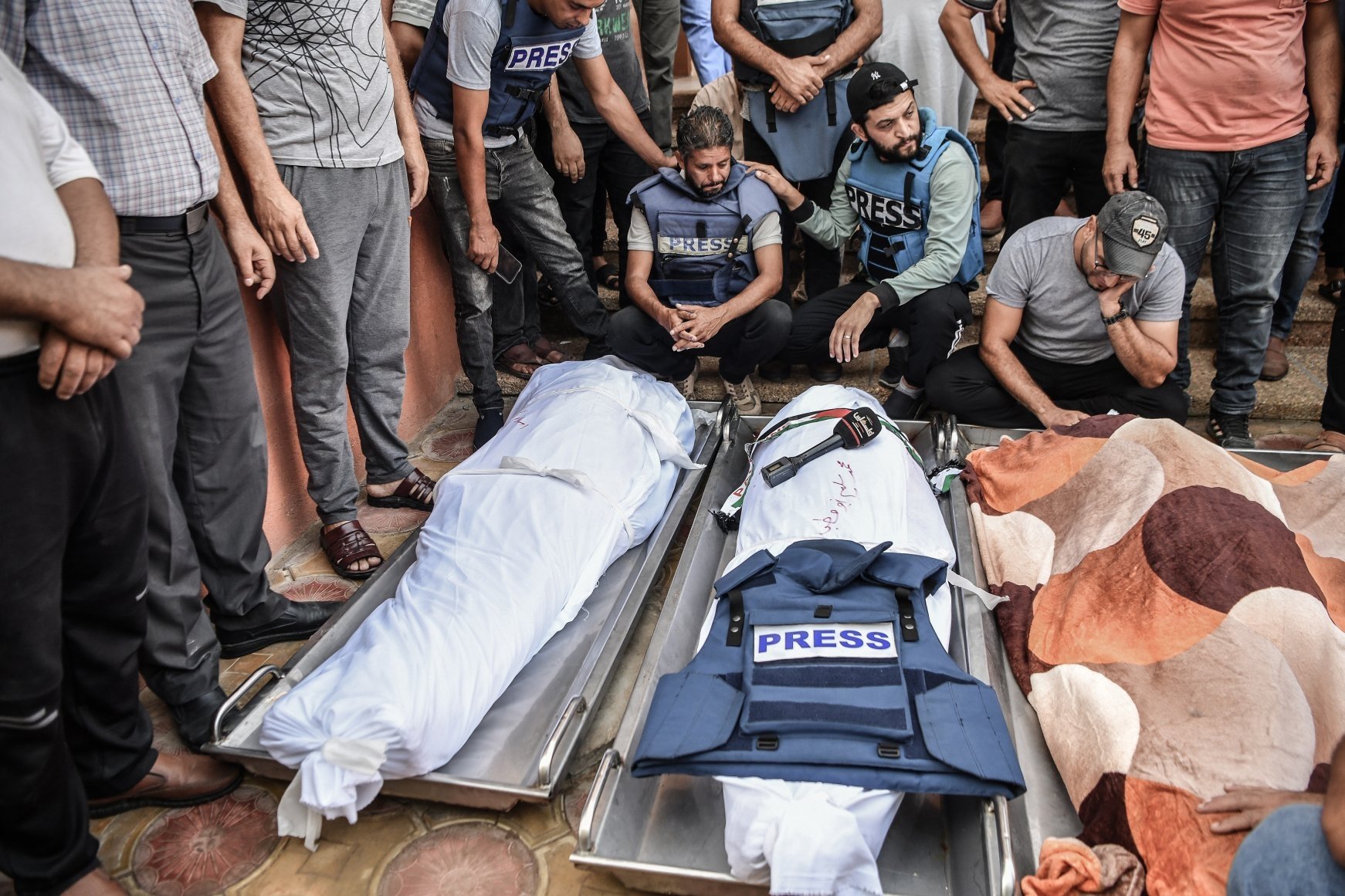© Turkuvaz Haberleşme ve Yayıncılık 2026
Israeli atrocities in the Gaza strip since the Oct. 7 Hamas incursion have sent shockwaves around the world with calls for investigations on possible war crimes.
Among the 15,000 people killed, mostly women and children, are 66 journalists, according to the Palestinian Journalists Syndicate. They were killed in the line of duty, carrying out their professional responsibilities amid relentless Israeli bombing and a growing humanitarian catastrophe.
While reporting in Gaza, Qasim al-Agha, a reporter for Beirut-based Palestinian Channel, and a Quds Feed Network correspondent Ahmed Abu Aziz shed light on the traumatic challenges of bearing witness to one of the most devastating attacks on Palestinian civilians in recent memory.
As journalists in the midst of war, they spoke exclusively to Daily Sabah, sharing details and evaluating Israel's inhumane brutality in the besieged territory through the lens of journalism.
Al-Agha said they had to continue journalistic responsibilities amid relentless attacks that created an atmosphere of constant fear.
"We work in a very frightening environment. Under severe mental and physical pressure. We are constantly in fear for our lives, as well as the lives of our loved ones, especially after the attack on my family home in Gaza."
Ahmed Abu Aziz highlighted the difficulties faced by Gaza's civilian population and the tragedy of the martyrs.
"The painful moments of civilians, the dramatic scenes of death, destruction and injuries we witness, are part of the hardships all Palestinians endure."
"But having martyrs from among your friends, relatives, acquaintances and even colleagues creates a significant challenge in carrying out our duties," he said.
With the pain of losing loved ones, Abu Aziz emphasized their determination to expose Israeli crimes committed in Gaza and other Palestinian territories and bring them to the world's attention.
"Despite the tragedies, we remain committed to uncovering and publicizing Israel's crimes. In this challenging process, moving forward without dwelling on the past, exposing injustice and the truth represent a significant responsibility and struggle for journalists," he added.

"We first trust in Allah, then we take protective measures like wearing helmets and bulletproof gear emblazoned with the word 'Press.' However, these measures often prove ineffective in the face of intentional Israeli attacks on journalists, the destruction of media institutions as well as the deliberate targeting of schools and refugee shelters belonging to the United Nations Human Rights High Commissioner for Refugees (UNRWA)," al-Agha added.
Abu Aziz emphasized the inadequacy and shortage of safety equipment amid the challenging conditions on the ground. "In Gaza, we face some significant challenges to ensure personal safety while on duty. To secure my safety, sometimes you have to borrow bulletproof vests and helmets from fellow journalists due to shortage. Despite persistent demand, we encounter significant shortages due to unavailability of material and constant power outages," he said.
"After witnessing the inhuman crimes (in Gaza), I was moved by the silence and the lack of reaction from the international, as well as Arab and Muslim communities. Their silence and unresponsiveness caused disappointment and sadness in the inner world of (Palestinian) people," he said.
"Before the Israeli attacks, I had a phobia of blood and surgery images. However, after reporting on the events, and covering the stories of mourners, martyrs and mutilated bodies, I got used to these horrific images. Now, these incidents have become commonplace for me, and my emotions dull," Abu Aziz said.
In the midst of these traumatic events, he continued live broadcasts and exposed the brutal Israeli attacks.
Sharing one of the most traumatic incidents he faced on the line of duty, he said: "During a live broadcast at the hospital in the early days of the war, I learned that my cousin, her husband and their four children were among the martyrs, while 25 other members of their family were injured in the attack on their house."
"The impact of this deliberate attack was immense on me. Despite this challenging situation, I continued to convey the news and message of this incident by performing my job objectively and reliably, exposing the crimes committed by the occupiers and condemning the attacks on Gaza," he said.
Al-Agha emphasized that the bloody events have had a deeply negative impact on journalists, but they cannot afford to abandon their duty.
"Of course, the bloody events have a deep negative impact on us and our spirit but we do not have the luxury of backing down. Because we have a homeland cause and it is the most just cause," he said.
He added that the Israeli occupation has a bloody history of killing civilians, especially children, women and the elderly. He mentioned that, like the Israeli actions against Turkish activists on the Mavi Marmara ship, those who show solidarity to break the siege on Gaza are also killed.
Likewise, Abu Aziz expressed the deep sorrow of losing four colleagues and more than 60 journalist friends, emphasizing their determination to continue the professional, humanitarian and patriotic mission of their departed comrades despite the pain they are going through. "Our grief is immense, but we are committed to carrying on their legacy. They dedicated their lives to this cause, and we will walk in their footsteps," he said.
